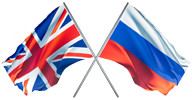As a lifelong Russophile I have seen political relations between the United Kingdom and Russia ebb and flow over the past 15 years or so but never quite reach as toxic a level as the 2014-16 period.
From the outset of the Ukraine Crisis political and by extension economic relations have been stretched to the limit. From Syria and Ukraine to the Litvinenko affair the potted histories of UK-Russia bilateral relations in the past decade is a mixed bag of mutual misunderstanding and mistrust which is by no means exclusive to Moscow or London.
Russia aside the political landscape of the UK has changed almost unrecognisably with BREXIT and the appointment of Mrs May and a new government – Russia too has changed immeasurably in the recent past. Its role in the near abroad and Moscow’s foray into the Middle East has put the country back on the map, not only as a resurgent and independently minded political player on the world stage but one that can use its unique influence and access to succeed where the West has faltered.
From its integral behind the scenes role in the removal of chemical weapons from Syria and the West’s seeming rapprochement with Iran it is certainly arguable that cooperation with Moscow is not only desirable but entirely necessary.
Of course there will always be core policy differences – to think otherwise would be naive but there are increasing areas of cooperation coming to the fore. Aside inalienable differences over the Ukraine crisis there remain and always have been considerable areas of potential cooperation in countering common threats such as global terror – an excellent and much needed starting point to wider partnership. With a well settled Russian community in the UK and UK business interests in the Russian economy for Russian business to name but two examples, there also remains a significant area of mutual interest in humanitarian, cultural and economic cooperation.
The unexpected announcement of a seeming olive branch call to Moscow by our new Prime Minster as well as increased Ministerial coordination and dialogue between Mssr’s Johnson and Lavrov herald in my view a significant step forward which can potentially pave the way for further political, cultural, economic and security cooperation.
At this stage and with sanctions in place as well as differences of opinion over a number of issues it would be prudent to expect a cautious rapprochement – what may seem as a minor affair, the interaction between two world leaders should not in this case be underestimated – with relations in the gutter since the Maidan this heralds a major step forward.
London and Moscow may not always see eye to eye and negotiations moving ahead may be tense but London’s olive branch to Moscow represents a sea change shift in our approach to UK-Russia bilateral relations. In short both the UK and Russia are too important on the world stage to not collaborate on core issues. When all is said and done this is early days but should discussions continue as planned the medium term outlook for UK-Russian affairs remains not only increasingly positive but necessary.
About Nic: Nic took over the Chairmanship of the WRF in January 2014. His interest in Russia and the Former Soviet Union began at university and has been steadily developing ever since! Nic is a passionate believer in healthy and prosperous relations between Russia and the UK. Aside the WRF Nic is a keen entrepreneur and set up Cobb Energy Communications in 2012, an energy sector focussed communications, technical and commodities consultancy with a pedigree in Russia.


